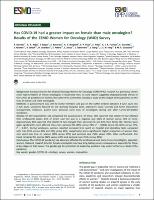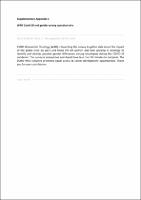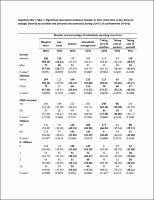| dc.contributor | Vall d'Hebron Barcelona Hospital Campus |
| dc.contributor.author | Garrido, Pilar |
| dc.contributor.author | Adjei, A. A. |
| dc.contributor.author | Bajpai, J. |
| dc.contributor.author | Berghoff, A. S. |
| dc.contributor.author | Choo, S. P. |
| dc.contributor.author | Felip Font, Enriqueta |
| dc.contributor.author | Garralda Cabanas, Elena |
| dc.contributor.author | Tabernero Caturla, Josep |
| dc.contributor.author | Banerjee, Susana |
| dc.date.accessioned | 2022-02-23T06:49:57Z |
| dc.date.available | 2022-02-23T06:49:57Z |
| dc.date.issued | 2021-06 |
| dc.identifier.citation | Garrido P, Adjei AA, Bajpai J, Banerjee S, Berghoff AS, Choo SP, et al. Has COVID-19 had a greater impact on female than male oncologists? Results of the ESMO Women for Oncology (W4O) Survey. ESMO Open. 2021 Jun;6(3):100131. |
| dc.identifier.issn | 2059-7029 |
| dc.identifier.uri | https://hdl.handle.net/11351/7072 |
| dc.description | Coronavirus SARS-CoV-2; COVID-19; 2019-nCoV Inequalities; Woman |
| dc.description.abstract | Background
European Society for Medical Oncology Women for Oncology (ESMO W4O) research has previously shown under-representation of female oncologists in leadership roles. As early reports suggested disproportionate effects of the COVID-19 pandemic on women, the ESMO W4O Committee initiated a study on the impact of the pandemic on the lives of female and male oncologists.
Methods
A questionnaire was sent to ESMO members and put on the ESMO website between 8 June 2020 and 2 July 2020. Questions focused on the working (hospital tasks, laboratory tasks, science) and home (household management, childcare, parent care, personal care) lives of oncologists during and after COVID-19-related lockdowns.
Results
Of 649 respondents, 541 completed the questionnaire. Of these, 58% reported that COVID-19 had affected their professional career, 83% of whom said this was in a negative way (85% of women versus 76% of men). Approximately 86% reported that COVID-19 had changed their personal life and 82% their family life. Women were again significantly more affected than men: personal life (89% versus 78%; P = 0.001); family life (84% versus 77%; P = 0.037). During lockdowns, women reported increased time spent on hospital and laboratory tasks compared with men (53% versus 46% and 33% versus 26%, respectively) and a significantly higher proportion of women than men spent less time on science (39% versus 25%) and personal care (58% versus 39%). After confinement, this trend remained for science (42% versus 23%) and personal care (55% versus 36%).
Conclusions
The COVID-19 pandemic has adversely affected the professional and home lives of oncologists, especially women. Reduced research time for female oncologists may have long-lasting career consequences, especially for those at key stages in their career. The gender gap for promotion to leadership positions may widen further as a result of the pandemic. |
| dc.language.iso | eng |
| dc.publisher | Elsevier |
| dc.relation.ispartofseries | ESMO Open;6(3) |
| dc.rights | Attribution-NonCommercial-NoDerivatives 4.0 International |
| dc.rights.uri | http://creativecommons.org/licenses/by-nc-nd/4.0/ |
| dc.source | Scientia |
| dc.subject | Pandèmia de COVID-19, 2020- |
| dc.subject | Oncologia |
| dc.subject | Qüestionaris |
| dc.subject.mesh | Coronavirus Infections |
| dc.subject.mesh | Oncologists |
| dc.subject.mesh | Surveys and Questionnaires |
| dc.title | Has COVID-19 had a greater impact on female than male oncologists? Results of the ESMO Women for Oncology (W4O) Survey |
| dc.type | info:eu-repo/semantics/article |
| dc.identifier.doi | 10.1016/j.esmoop.2021.100131 |
| dc.subject.decs | infecciones por Coronavirus |
| dc.subject.decs | oncólogos |
| dc.subject.decs | encuestas y cuestionarios |
| dc.relation.publishversion | https://doi.org/10.1016/j.esmoop.2021.100131 |
| dc.type.version | info:eu-repo/semantics/publishedVersion |
| dc.audience | Professionals |
| dc.contributor.organismes | Institut Català de la Salut |
| dc.contributor.authoraffiliation | [Garrido P] Universidad de Alcalá, Medical Oncology Department, IRYCIS, Hospital Universitario Ramón y Cajal, Madrid, Spain. [Adjei AA] Mayo Clinic, Rochester, USA. [Bajpai J] Tata Memorial Centre, Mumbai, India. [Banerjee S] The Royal Marsden NHS Foundation Trust, Institute of Cancer Research, London, UK. [Berghoff AS] Division of Oncology, Department of Medicine 1, Medical University of Vienna, Vienna, Austria. [Choo SP] Curie Oncology Singapore, National Cancer Centre Singapore, Singapore. [Felip E] Servei d’Oncologia Mèdica, Vall d’Hebron Hospital Universitari, Barcelona, Spain. Thoracic Oncology and H&N Cancer Unit, Vall d’Hebron Institute of Oncology (VHIO), Barcelona, Spain. UVic-UCC, Barcelona, Spain. [Garralda E] Early Drug Development Unit, Vall d’Hebron Institute of Oncology (VHIO), Barcelona, Spain. Vall d’Hebron Hospital Universitari, Barcelona, Spain. [Tabernero J] Servei d’Oncologia Mèdica, Vall d’Hebron Hospital Universitari, Barcelona, Spain. Vall d’Hebron Institute of Oncology (VHIO), Barcelona, Spain. UVic-UCC, Barcelona, Spain |
| dc.identifier.pmid | 34144778 |
| dc.identifier.wos | 000663044500027 |
| dc.rights.accessrights | info:eu-repo/semantics/openAccess |



